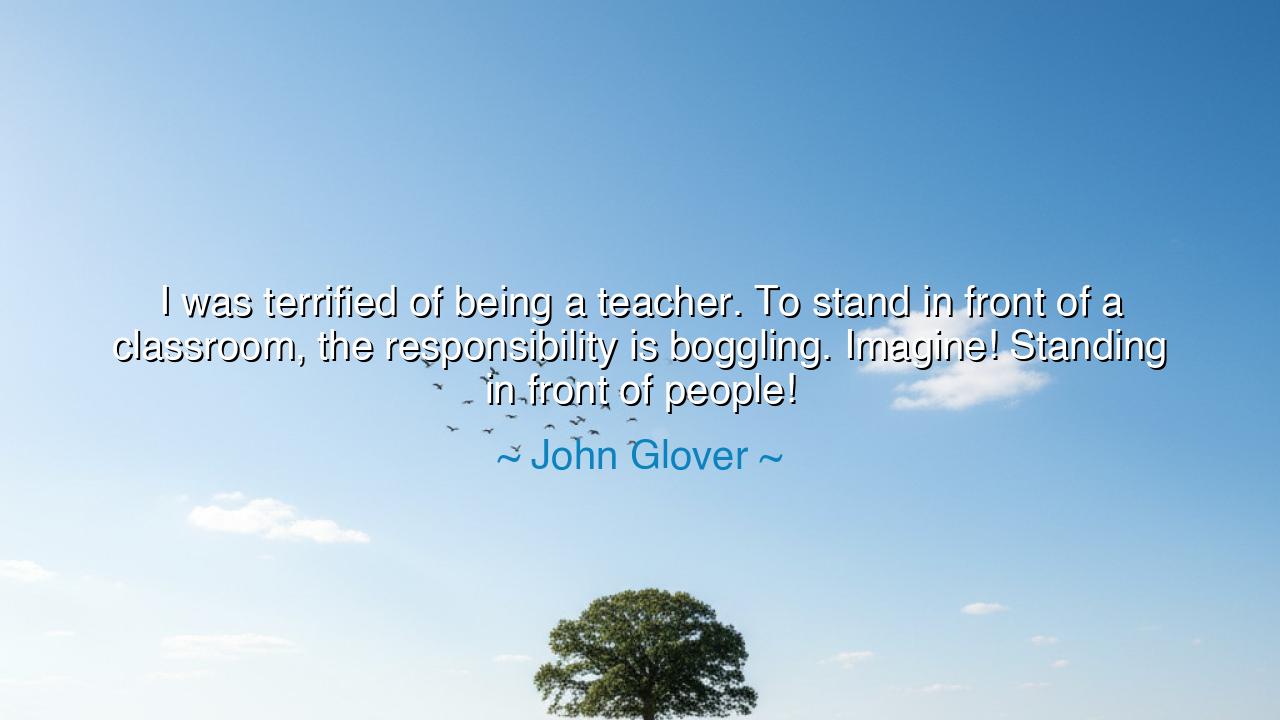
I was terrified of being a teacher. To stand in front of a
I was terrified of being a teacher. To stand in front of a classroom, the responsibility is boggling. Imagine! Standing in front of people!






The words of John Glover—“I was terrified of being a teacher. To stand in front of a classroom, the responsibility is boggling. Imagine! Standing in front of people!”—speak with the raw, trembling honesty of one confronting the weight of authority and the burden of influence. Here, the teacher is revealed not merely as an instructor of facts, but as a guardian of minds, a guide whose presence shapes thought, curiosity, and character. The terror Glover describes is not fear of speaking or failing—it is the profound recognition of the responsibility inherent in standing before others, in holding their attention and shaping their understanding.
The meaning of this reflection is that teaching is a sacred and daunting duty. To stand before learners is to assume not only authority but moral and intellectual responsibility. The teacher is entrusted with the cultivation of minds, the transmission of knowledge, and the nurturing of curiosity and discernment. Glover’s fear, therefore, is the acknowledgment that teaching is an act with consequences far beyond the immediate classroom—it is an engagement with the formation of human potential.
History provides examples of this weight carried by those who teach. Consider Socrates, who walked the streets of Athens questioning, probing, and instructing young minds. The responsibility he bore was immense; each question, each challenge, held the power to awaken understanding or provoke resistance. Socrates’ teaching demanded courage, presence, and awareness, as he faced not only the intellectual growth of his pupils but also the scrutiny of society itself. Like Glover, he understood that to stand in front of minds seeking guidance is to hold a profound trust.
Even in the realm of modern education, the experience of novice teachers echoes Glover’s sentiment. Many, upon their first classroom experience, are struck by the immensity of the task: to engage, inspire, and correct with both authority and compassion. The responsibility is broad and deep, encompassing not only the transmission of content but the cultivation of ethical, curious, and resilient human beings. This is the essence of teaching—the awareness that influence extends far beyond the measured syllabus.
The lesson for us, O seekers, is that fear and respect for responsibility are natural companions of meaningful work. To stand in front of others, whether as teacher, leader, or guide, is to acknowledge the power and responsibility inherent in shaping thought and action. Glover’s honesty reminds us that such apprehension is not weakness, but recognition of the profound significance of the role. Courage emerges when one accepts the weight of responsibility while striving to act with clarity, fairness, and intention.
Practically, this means preparing thoroughly, cultivating presence, and nurturing empathy. A teacher or leader must understand both the material and the audience, recognizing that each word and gesture carries weight. Begin with humility, acknowledging the gravity of influence, and pair it with patience and adaptability. Accept fear as a guide, not as a barrier—it signals the importance of the task and the necessity of deliberate action.
Thus let it be inscribed upon the scrolls of memory: to stand before minds in instruction is both privilege and burden, awe-inspiring and intimidating. Responsibility is the hallmark of meaningful teaching, and fear is a natural compass pointing toward the significance of the role. John Glover’s reflection reminds us that courage is born not from the absence of fear, but from the embrace of responsibility and the commitment to shape understanding with wisdom, care, and presence.






AAdministratorAdministrator
Welcome, honored guests. Please leave a comment, we will respond soon